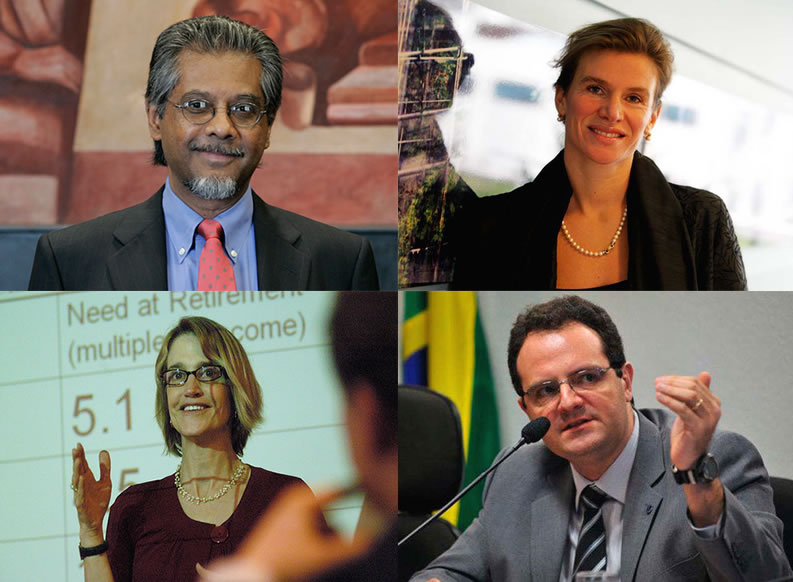
New School For Social Research is a Guiding Force In Economic Theory
For the better part of a generation, the world’s economic system has been dominated by libertarian free market theory, which promotes small government, deregulation, and a host of other conservative ideas.
However, the way Anwar Shaikh, chair of the Economics Department at The New School for Social Research (NSSR), sees it, “this theory has proven itself unable to understand the world.” According to Shaikh, the policies associated with this theory, pursued so aggressively by governments and financial institutions around the world, helped bring about the 2008 financial crisis and the Great Recession, as well as widening income inequality and shrinking the middle class.
It’s no surprise, then, that more and more people are being drawn to a broader range of economic theories — from Keynesian and post-Keynesian economics to the classical political economy of Smith, Ricardo, and Marx to structuralist and institutionalist philosophies — that have shaped NSSR’s Economics curriculum for decades. This approach, coupled with an engagement with the central unresolved dilemmas of modern society, has made the Economics Department a leading light in the field of economic thought and study.
“The New School Economics Department curriculum has had excellent coverage all along, but they have not been taken seriously by orthodox economics, which have become extremely conservative in the last 30 years,” Shaikh says. “The world is looking for different approaches, and that’s why our program stands out.”
The Economics Department has indeed made a mark as faculty members and alumni have stolen the spotlight in the worlds of politics and publishing. Take Shaikh, who this year embarked on an international tour to promote his critically acclaimed new book, Capitalism: Competition, Conflict, Crises. In it, he critiques mainstream neoclassical economic ideology and offers an alternative framework for understanding modern markets.
Or Teresa Ghilarducci, Shaikh’s colleague, who recently released a popular book, How to Retire with Enough Money: And How to Know What Enough Is. In it, she cuts through misinformation and bad policymaking to deliver the basic principles that will help readers grow their investments. Ghilarducci previously published When I’m Sixty-Four: The Plot against Pensions and the Plan to Save Them, in which she tackles the pressing issue of America’s retirement savings crisis and makes the case for an expansion of Social Security.
Alumni have been turning heads as well. Owing to her extensive experience in public policy research and advocacy organizations, Heather Boushey, Economics ’98, was recently named Hilary Clinton campaign’s chief economist. Currently the executive director of the Washington Center for Equitable Growth, Boushey has proposed a national paid leave program that would be available to all workers, tied to lifetime work history rather than current job tenure, and generous enough to safeguard the economic security of low-wage workers who decide to take leave.
Mariana Mazzucato, PhD Economics ’98, is a renowned economic thinker. In her acclaimed book The Entrepreneurial State: Debunking Public vs. Private Sector Myths, she dismantles the notion of the laggard state at odds with a dynamic private sector, asserting that the opposite is true: The private sector only finds the courage to invest and innovate when the state makes high-risk investments.
Nelson Barbosa, PhD Economics ’01, served as finance minister of Brazil during part of the term of former President Dilma Rousseff. Besides being a graduate of The New School, Barbosa worked as an economic analyst at the Brazilian Central Bank and as a member of the senior economic staff at the Brazilian Ministry of Finance.
“For a small university, we have quite an impact on the critical debates of our time,” Shaikh says.
The impact made by faculty and alumni can be traced to the Economic Department’s forward-thinking approach to the study and application of economic theories. Within the Department’s various programs — including the PhD, MS, and MA in Economics; MA in Global Political Economy and Finance; and Master of Philosophy in Economics — instructors stress the study and analysis of heterodox schools of thought, including the history of how they came to be; a rigorous approach to academics; and a dedication to confronting the most pressing issues of our time.
What’s more, Shaikh notes, “Faculty and alumni are recognizing the fruits of their labor because the world is turning our way.” Rather than putting their faith in a single— and by many accounts, failed— way of thinking, people are beginning to open up to different approaches to understanding and influencing the world. And NSSR’s Economics Department, more than any other department of its kind, has long been to be a guiding force in that effort.
“The steps needed to bring economics teaching into the real world do not require the invention of anything new or exotic,” Shaikh says, quoting a September 2014 editorial in the Financial Times. “The curriculum should embrace economic history and pay more attention to unorthodox thinkers such as Joseph Schumpeter, Friedrich Hayek, and, yes, even Karl Marx. Faculties need to restore links with other fields such as psychology and anthropology, whose insights can explain phenomena that economics cannot. Economics professors should make the study of how people act the starting point of courses, not an afterthought.”